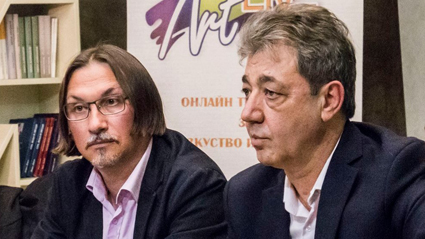The premiere of a new book entitled “Former People according to State Security Classification” brought together hundreds of people who still crave for justice because of the unpunished crimes of communism. The book’s first print run has been sold out for just a week.
"Former people" was a label put on industrialists, clerics, military, politicians, and intellectuals - all persons who contributed to the development of Bulgaria before the coup on September 9th 1944. The communists borrowed the terminology after the nationalization in 1947 from the Stalinist NKVD in order to label people who lost their social and public status after the change of power. On more than 500 pages in his book "Former People," professors Villi Lilkov and Hristo Hristov reveal the scale and ways of repressions imposed on the most capable, the most educated and most virtuous Bulgarians. And although they were successfully isolated from society, the totalitarian power never managed to crush their spirit.
 “The repressions against the so called ‘former people’ continued until November 10, 1989 and included displacements, camps, various administrative and judicial punishments, but the so called justice of the Bulgarian Communist Party was political and not objective,” Hristo Hristov says. “And, of course, the repressions were also transferred to the sons and daughters of these people with the mandatory surveillance. They were oppressed whether they were trying to find a job or trying to enter universities, as many were forbidden to continue their education. Indeed, the invisible repression of State Security did not stop at all during the nearly half-century-long totalitarian regime. And since the party always needed enemies, it turned the so-called ‘former people’, who are holders of the values of the Bulgarian National Revival as its main ideological opponents.”
“The repressions against the so called ‘former people’ continued until November 10, 1989 and included displacements, camps, various administrative and judicial punishments, but the so called justice of the Bulgarian Communist Party was political and not objective,” Hristo Hristov says. “And, of course, the repressions were also transferred to the sons and daughters of these people with the mandatory surveillance. They were oppressed whether they were trying to find a job or trying to enter universities, as many were forbidden to continue their education. Indeed, the invisible repression of State Security did not stop at all during the nearly half-century-long totalitarian regime. And since the party always needed enemies, it turned the so-called ‘former people’, who are holders of the values of the Bulgarian National Revival as its main ideological opponents.”
Bulgaria is the only eastern European country where officials of the former State Stater Security and senior communist party members have become key figures of the transition period and have take control of key positions in business, banking, the judiciary, media, and politics. Even today, State Security agents occupy ministerial posts, sit in parliament, give advice the president… So, it is logical to ask whether there are "former people" today - people for whom some doors are still closed, people marginalized and humiliated, not needed by the new system?
“Sadly, that's true,” Hristo Hristov says. “Not only the so-called ‘former people’ and their families, but all the victims of communism were quickly pushed to the periphery of society. And we are all responsible for having no memory of the totalitarian past, for this ‘organized process of oblivion’, as Professor Evelina Kelbecheva calls it. “In the last few years since Russia occupied Crimea, we see how easily the mistakes of the near history can be repeated,” Christo Hristov says. “It is therefore important for the young generation to know the truth about the totalitarian period, especially when myths are cleverly propagated. Myths such as how good it was back then using brainwashing methods through the Internet and the media. And if society and young people do not know what the price of freedom is, then it can be easily lost.” "Former People" is a book that is good to be present in every Bulgarian home. In order to end once and for all fictitious stories of some elderly people about the “comfort” and “peaceful life” during the times of socialism. Young people must find out about the atrocities committed by the criminal communist regime and keep the mission of protecting freedom in their hearts."
“Freedom is never more than one generation away from extinction,” Ronald Reagan once said.
English: Alexander Markov
At the end of the past week, 53 children from 21 Bulgarian Sunday schools participated in the ninth edition of the international reading competition in Bulgarian "Az Buki Vedi" for first and second grade students, which took place in..
The engineering plans for the expansion of the Bulgarian Centre in Billerica, New England, USA (BCNE), are ready. According to information from the centre's Facebook page, cited by BTA, the centre and the Bulgarian Church 'St. Petka' are now looking for a..
Summer, high temperatures, holiday mood. But unfortunately, summer brings not only positive emotions, but real and very serious problems. For example, last year, over 400 settlements throughout Bulgaria, including several major towns, remained "dry" or..
The consulates of a country abroad are usually seen simply as the place where citizens go when they need assistance—whether to obtain documents or resolve..
One of Bulgaria's longest-running summer festivals takes place in Primorsko , a resort town on the Black Sea coast. Over the next three months, Prim..
Colourful, ethereal, and subtle, butterflies are everywhere around us – day and night, in the city and in the countryside. However, zoologists warn that..

+359 2 9336 661
